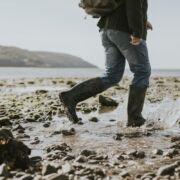According to the Closing the Addiction Treatment Gap (CATG) Initiative, there are twenty-three million Americans who are currently struggling with an addiction. Only one in 10 of them receives the proper treatment that they need, leaving a treatment gap of more than 20 million Americans. We can do better—we have to do better.
With a pandemic still in full force, healthcare and mental health professionals have been working endlessly to find innovative ways to help those battling addiction and mental health issues receive the treatment they need. Entering a 90-day treatment facility is not for everyone, and it isn’t available for everyone, whether it be the cost or other variables. There are other types of treatment that are available for those struggling. An effective treatment that does not involve your stereotypical image of what recovery entails or a form of therapy that doesn’t enclose you in four walls. It’s a form of therapy that promotes personal development, teaching you healthy, functional coping mechanisms while also allowing you to maintain social distance. Have you ever heard of adventure therapy?
What is Adventure Therapy?
Adventure therapy is a form of psychotherapy that has actually been around since the 1960s. It combines nature, community, and thrilling exercises for therapy. Adventure therapy has been shown to improve a person’s physical, social, spiritual, and psychological well-being. Spending time in nature has always been a great way for individuals to connect and heal themselves. With evidence-based, experimental therapy, recreational activities, and wild wilderness expeditions, adventure therapy helps individuals find their path to recovery. Addiction is a family disease, and another great thing about adventure therapy is that the whole family can benefit and be involved. In fact, adventure therapy has shown to help families overcome behavioral issues and heal wounds caused by addiction. Adventure therapy is not only highly effective for those with substance abuse problems, but for those struggling with various mental health concerns.
How Does it Work?
With the help of a trained adventure therapist, individuals will learn healthy coping mechanisms using methods that can actively, and naturally stimulate themselves. For example, individuals who have trust issues may be required to engage in activities using outdoor rope courses. If families have a hard time working as a team, you guys might be asked to work as a team as you paddle through raging rapids. Let’s pretend that you are struggling to assert your need to gain independence; your therapist could teach you how to rock climb, an activity where individuals must learn how to depend on themselves to keep that climb progressing. The possibilities and experiences can truly be endless. With a combination of adventure and traditional therapy, Adventure therapy can help promote rehabilitation, growth, and development. Adventure therapists strive to teach each patient mindfulness throughout each activity while aiming to assist patients to connect life experiences with the outdoor activity they are engaging in.
Through adventure therapy, patients can learn the power of hands-on problem solving, sometimes facing fears, and challenges but in the end, overcoming it all! Some patients have mentioned that during their isolation in nature, they have experienced spiritual awakenings, transforming their self-image, and increasing their self-confidence. Throughout the whole experience, your therapist is rooting for you to become the best version of yourself while helping you meet your goals.
Benefits of Adventure Therapy
Regular physical activity is one of the best things we can do for our physical and mental health. Adventure therapy gets you outside, to not only physically move your body, but to get those neurotransmitters snapping more effectively. It has helped individuals with:
- Eating disorders
- Post-traumatic Stress Disorder (PTSD)
- Substance abuse
- Depression
- Anxiety
- Grief
- Stress
Adventure therapy can also be helpful to
- Build positive, trustworthy relationships
- Acquire functional, encouraging social skills such as communication and conflict resolution
- Increase resiliency
- Encourages emotional discovery
- Improves emotional/behavioral functioning
- Teaches healthy coping mechanisms, including stress management skills
Finding the Best Treatment
Therapy and recovery look different for everyone. It’s okay to try something new—the greatest thing you can do for yourself is to keep trying, to keep fighting for your physical and mental health. If you or someone you love is struggling with their recovery, maybe it’s time to try something outside of the box. When individuals can find enjoyment throughout their recovery, they are more likely to continue living their healthiest life. Take the step to become your best, most adventurous self yet. Many facilities are now offering innovative treatments like adventure therapy. Reach out to a treatment professional today to learn more about adventure therapy.
Your path to a healthier you is possible. Sometimes we just do not know where to begin. Other times, we have tried various methods of therapy, but they don’t work well for us. When this happens, it can leave people feeling overwhelmed with negative emotions. The mental health and recovery field continues to seek innovative ways to help individuals battle their struggles. Whether someone is battling a substance use disorder or a mental illness disorder, many patients have fallen in love with adventure therapy. Sometimes all it takes is to get back into nature, climbing, kayaking, and building functional skills such as conflict resolution. Individuals who have participated in adventure therapy have shown an increase in self-confidence and a decrease in stress, depression, and anxiety. Reach out to Achieve Concierge today. Our staff can help you find resources to teach you more about Adventure therapy. Call Achieve at (619) 393-5871.



